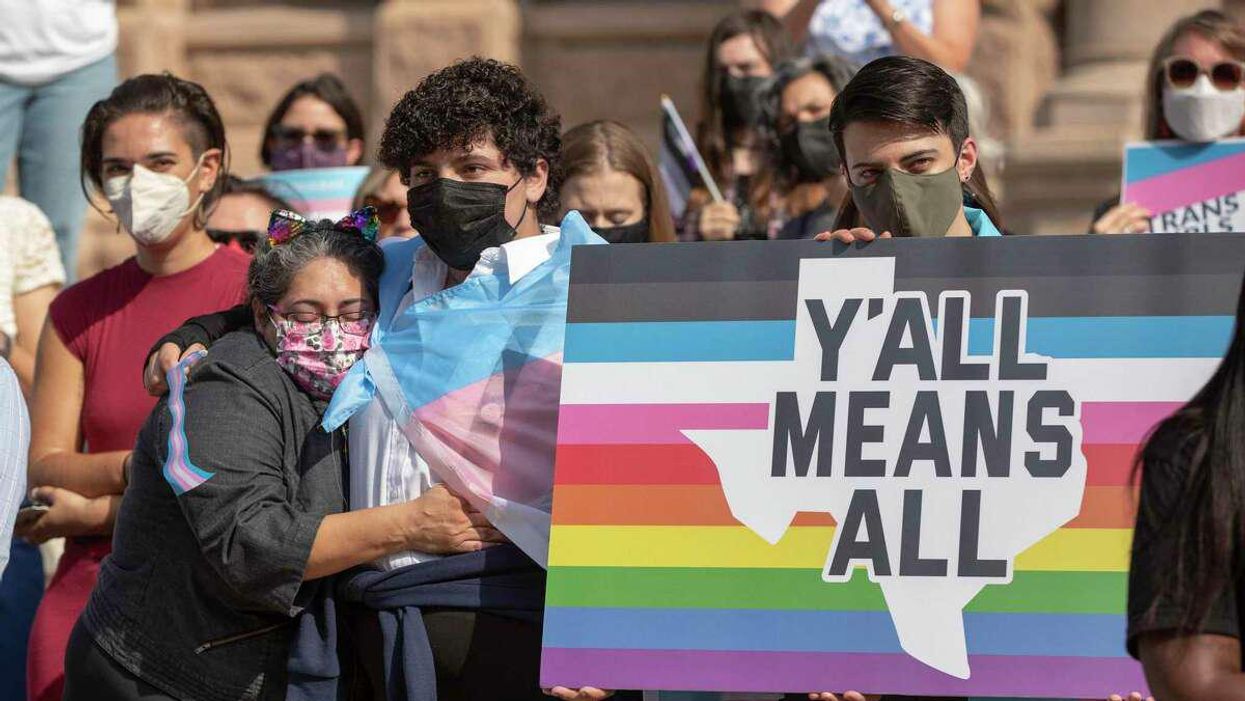Texas Governor Bullies Parents Of Transgender Kids
Texas Gov. Greg Abbott is a staunch champion of parental rights. In January, he proposed amending the state constitution to incorporate a "Parental Bill of Rights." The goal, he said, "is to ensure that parents are put at the forefront, both of education of their children as well as the decision-making for their child's healthcare."
Abbott, a Republican, believes the government has no business interfering with the choices families make to protect the health and well-being of children. Yes, he does. And I'm Billie Eilish.
This is the very same governor who on Tuesday gave Texas parents a firm order to butt out. In a letter to the state Department of Family and Protective Services, he claimed that it is illegal for parents to allow "gender-transitioning" treatments for their children.
Abbott added, "Texas law imposes reporting requirements upon all licensed professionals who have direct contact with children who may be subject to such abuse, including doctors, nurses, and teachers, and provides criminal penalties for failure to report such child abuse."
It's not enough to terrorize parents coping with profound, intimate issues. He also wants to intimidate anyone who might have any role in, or even knowledge of, these treatments.
The governor was following the lead of Attorney General Ken Paxton, who said Monday that gender-transition therapy constitutes child abuse and "must be halted." The two are not deterred by the fact that, as Adri Perez, an official of the American Civil Liberties Union of Texas noted, "there's no court in Texas or the entire country that has ever found that gender-affirming care can constitute child abuse."
It's fair to infer that Abbott and Paxton are motivated not by an abiding concern for transgender kids but by hostility toward the whole concept. Both endorsed a 2017 bill prohibiting transgender Texans from using the restrooms in public buildings that correspond to their gender identity. (It failed.)
Most medical experts don't see transition therapies as harmful, much less criminal. They regard puberty blockers, hormone treatments, and surgery as indispensable tools in caring for children coping with "gender dysphoria."
"Every major medical association in the United States recognizes the medical necessity of transition-related care for improving the physical and mental health of transgender people," says the American Medical Association. "It is inappropriate and harmful for any state to legislatively dictate that certain transition-related services are never appropriate and limit the range of options physicians and families may consider when making decisions for pediatric patients."
The choices facing parents of transgender children are complex, daunting and often painful. Paxton says gender-transition therapies must be banned because they can have irreversible physical consequences, including infertility. But forbidding these treatments can also cause irreversible harm.
A transgender girl or boy who is deprived of puberty blockers will never be able to alter some of the effects of the physical changes that naturally occur during adolescence. Either option has grave consequences — making it especially critical that the choice is made by those who are most affected by it.
But Abbott and Paxton would put parents who approve medical interventions in the same category as adults who beat, starve, molest or neglect their children. It's like saying that a mother who takes her child to the dentist for a tooth extraction is no better than a woman who knocks her kid's teeth out.
These politicians have a record of inserting themselves into decisions that are none of their business. Texas requires minors to get a parent's consent for an abortion. But last year, Abbott signed a law making the procedure illegal after about six weeks' gestation — which means that at a very early stage, parents and daughters no longer have the option of terminating a pregnancy.
This measure is another case of using state power to damage the health of children. Carrying a fetus to term, as any mother can tell you, has major, irreversible effects on a woman's body. Pregnancy and childbirth also carry serious hazards, particularly for teens.
"Complications during pregnancy and childbirth are the leading cause of death for 15-19-year-old girls globally," reports the World Health Organization. But Abbott and the Texas legislature have chosen to force the vast majority of minors who get pregnant to give birth.
Abbott and Paxton are staunchly in favor of protecting the rights of parents to make choices for their kids only if those choices are agreeable to Abbott and Paxton. If not, they have a message for parents: Get out of our way.
Reprinted with permission from Creators.com



